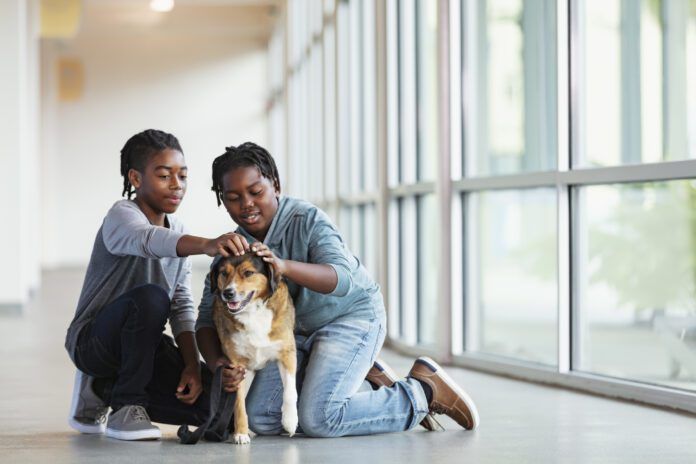Adopting a rescue dog is a great way to help a dog in need, but it is critical to make sure that you know what you are committing to and that the dog will be a good fit for your family.
The term “rescue” can cover a wide range of situations, from a well-organized operation that has protocols for providing care and an established network of fosters to one person with a bunch of dirty crates in a back room. Rescues may be 501c3 non-profits, although this does not necessarily indicate quality or lack thereof. Some specialize in particular breeds or mixes, others focus on special-needs dogs who require extra care, and others take all comers.
Green flags for a good rescue are when the volunteers can answer your questions about the dogs, provide veterinary records, and the dogs are clean, relaxed, and healthy.
The fun part is figuring out which dog speaks to you and will be your perfect companion. Here are some questions to ask when considering adopting a dog from a rescue.
Where Is the Rescue Dog From?
Some rescue groups only take in local dogs, but others may have networks across several states. This is particularly common with breed-specific rescues. Many breed clubs for show dogs have an affiliated rescue group that focuses on helping dogs of their breed, picking them up from shelters and placing them in foster homes that are familiar with their behavior traits and needs.
Why is it good to know the dog’s original location? Some regions have increased health risks. For example, dogs from the southern United States are more likely to have heartworms, and dogs from the Midwest are at higher risk of having the fungal infection blastomycosis. Knowing where the dog came from allows you to assess possible risks and plan appropriate veterinary care and testing that might be necessary.
Is the Rescue Dog Vaccinated?
Rescues should provide a vaccination history. Best-case scenario, the rescue will have vaccination records from the previous owner. Worst-case scenario, the rescue should start the dog on core vaccines such as rabies, distemper virus, parvovirus, and leptospirosis. Bordetella (kennel cough) is another common vaccine, especially if the rescue houses many dogs in the same facility.
Depending on how long the dog was with the rescue before being adopted, they may need boosters of one or more vaccines. The rescue should provide clear dates on when vaccines are next due.
Has the Dog Been Tested for Heartworm?
Heartworm is most common in warm, moist environments, but dogs have tested positive all over the United States and beyond. Heartworm is a critical issue for rescue dogs because treating a heartworm infection is expensive and dangerous. Not treating it at all will ultimately be fatal.
Ideally, dogs should be tested for heartworms once they reach 6 to 8 months of age. If the dog tests negative, she should be put on a monthly preventive medication and then tested again six months later. Why the second test? It can take six months for an active infection to show up on the routine tests, so that second test is verifying that your dog truly is negative for heartworm. Only testing once in a dog with unknown health care history could give a false sense of security.
It is up to you if you wish to adopt a dog who is heartworm positive. The rescue may be able to help cover costs of treatment, and many of these dogs go on to live normal lives. But you want to know the dog’s heartworm status before adoption so that you can make an informed decision.
What Breed or Mix Is the Rescue Dog?
Breed or mix gives you a rough idea of what the dog’s training and grooming needs will be. This is especially helpful for puppies, as it gives you an idea how big the puppy will be as an adult. Depending on how the dog came to be in the rescue, the rescue may not know the dog’s exact breed/mix, but they will give their best guess.
How Many Homes Has the Rescue Dog Had?
There is no hard-and-fast rule on this one. Some dogs get passed through multiple homes through no fault of their own, while others are serially rehomed because they have severe behavioral problems. Knowing how many previous homes the dog has been through just gives you an idea of what her life has looked like up to this point.
What Is the Rescue Dog’s Personality?
Ask what the dog is like in a familiar environment, what her play style is, and how she responds to loud noises or new people. Find out how the dog handles restraint for basic grooming and veterinary care. If you have children or other pets, ask if she has been around them and how it went. Try to talk to the person or people who have spent the most time with the dog, such as her foster.
Keep in mind that personality can change as puppies mature and as the dog settles into a new home. The information that you get from the rescue and foster homes is a baseline.
Does the Rescue Dog Have a Bite History?
Adopting a dog with a bite history could be problematic for your renter’s or home insurance. If the dog has bitten someone before, ask about the circumstances around the incident. It may be helpful to consult with a veterinary behaviorist to determine if you have the skills to train and manage this dog.
What Is the Rescue Dog’s Health Status?
All dogs taken in by a rescue should receive a veterinary exam and have urgent health needs addressed. The dog should be healthy before being adopted out, or you should be provided with detailed information on what health concerns the dog has and what care is needed now or may be needed in the future.
Keep in mind that for many rescue dogs, we do not have any information on their parents’ health or their past health history. Happy bouncy puppies may develop symptoms of hip dysplasia as they mature, or the dog may develop kidney failure because of untreated Lyme disease before they came into the rescue’s care. A clean bill of health today is not a guarantee that the dog will always be healthy as neither the rescue nor the veterinarian has a crystal ball.
Has the Rescue Dog Had Any Training?
Rescue dogs can run the gamut from completely untrained hooligans to perfect well-mannered canine citizens. This boils down to the training and socialization that they received in their “first lives,” how long they were with the rescue, and what training resources and abilities the rescue and/or foster may have had.
Consider if you are comfortable taking on a dog who is a clean slate, or if you need a dog with some features already installed. Things to consider are house training, crate training, walking on a loose lead, and basic commands such as sit, down, wait, and come. Adult dogs who have developed bad habits can be difficult to house train and require patience and persistence. If you do not have a fenced yard and will have to walk your new dog on a leash, adopting a dog who already has some basic leash skills may be a must.
What Is the Rescue’s Application Process?
The adoption process will vary widely among rescues. Most will have some sort of adoption application form and ask about your current and previous pets, who your vet is, and if you have a fenced yard. These questions help gauge if you have thought through what it takes to care for a dog and if the dog you are interested in is a good fit.
Some rescues may ask for references or to do a home visit. You also may be able to do one or more meet-and-greets to get to know the dog before adoption.
What If It Doesn’t Work Out?
Even with the best intentions and planning from both you and the rescue volunteers, sometimes a dog who looks like a perfect fit on paper just isn’t. Ask what the rescue’s policy is on returning a dog, and if there is a specific timeframe for you to do a trial run to see if the dog fits with your family and lifestyle.






